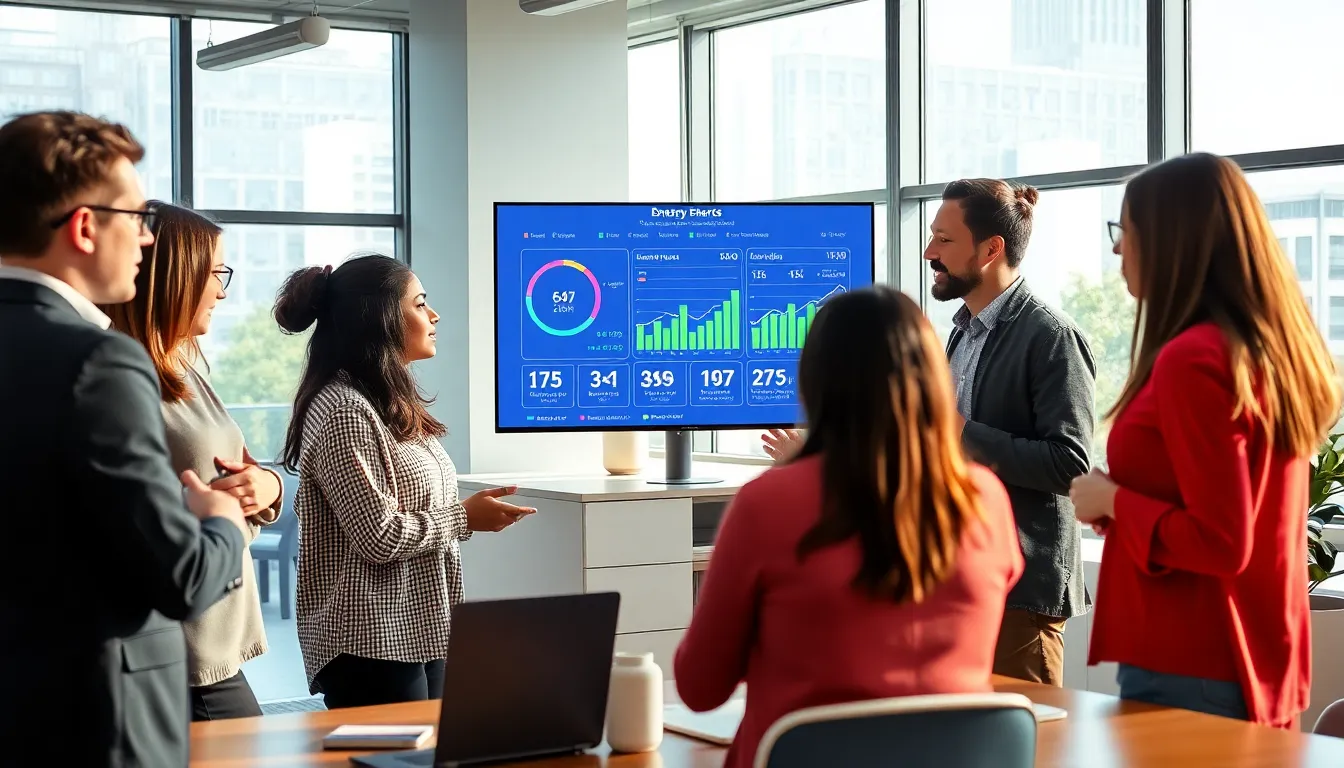Table of Contents
ToggleImagine a world where your toaster knows exactly when to pop up your bread, all while your smart thermostat ensures your home is at the perfect temperature. Welcome to the age of the Internet of Things (IoT) in energy management. This isn’t just about convenience; it’s about revolutionizing how we consume and conserve energy.
Overview of IoT for Energy
IoT technologies significantly enhance energy management processes. Smart devices like thermostats and meters connect to the internet, allowing for real-time data collection and monitoring. These devices facilitate communication between appliances, enabling automatic adjustments to optimize energy usage.
Energy consumption patterns become more transparent with IoT solutions. Businesses and homeowners access detailed insights, which leads to informed decisions about energy usage. For instance, IoT sensors can identify peak consumption times, helping users adjust their behaviors accordingly.
Renewable energy sources benefit from IoT integration. Grid operators leverage IoT data to balance supply and demand efficiently, thus stabilizing the energy grid. This capability supports the integration of solar panels and wind turbines by analyzing their performance data.
Cost savings often arise from IoT-enabled energy solutions. Immediate feedback on energy efficiency encourages users to change their habits, ultimately reducing waste. A study from the International Energy Agency indicates that IoT applications can lead to a 10-30% reduction in energy consumption.
The automation of energy management contributes to sustainability. Smart grids utilize IoT technology to manage distributed energy resources effectively. By coordinating generation and consumption, these systems minimize carbon footprints while enhancing energy reliability.
Ultimately, the intersection of IoT and energy reshapes how communities consume and manage energy resources. Innovative solutions pave the way for smarter, more sustainable energy practices across various sectors.
Benefits of IoT in Energy Management

IoT significantly enhances energy management by streamlining energy usage, driving cost savings, and promoting sustainability.
Enhanced Efficiency
Improved efficiency results from IoT in energy management. Devices communicate seamlessly, allowing for automatic adjustments that reduce unnecessary energy consumption. Smart thermostats can learn user preferences, optimizing heating and cooling cycles based on real-time data. Indoor lights can adjust brightness based on occupancy, saving energy when no one is present. Businesses also benefit, as energy management systems provide tailored analytics that help identify inefficiencies. A report from the International Energy Agency states that IoT can lead to energy consumption reductions of 10-30%. Overall, enhanced efficiency driven by IoT enables users to minimize waste and maximize the value of their energy resources.
Real-Time Monitoring
Real-time monitoring revolutionizes the way energy users interact with their consumption. IoT devices track energy usage continuously, providing immediate feedback on consumption patterns. Detailed insights allow users to recognize peak usage times, facilitating better energy management practices. With this data, homeowners can shift energy-intensive tasks to off-peak hours, optimizing costs. Utilities can respond more effectively to grid demands, ensuring a steady supply of energy. Access to up-to-date information on consumption empowers users to make informed decisions, ultimately leading to more sustainable energy practices. Through real-time monitoring, IoT fosters a proactive approach to energy management.
Key Technologies in IoT for Energy
IoT technologies revolutionize energy management through a range of advanced solutions. These solutions include smart meters and IoT sensors, which enhance efficiency and sustainability.
Smart Meters
Smart meters play a crucial role in energy management. They provide real-time data on energy consumption, allowing users to track usage patterns accurately. Smart meters enable utilities to monitor energy distribution efficiently, reducing waste and improving grid stability. With immediate feedback, consumers can make informed decisions about their energy usage. The International Energy Agency reports that smart meters contribute to a 10-30% reduction in energy consumption. This reduction stems from users adjusting their habits in response to insights gained from their smart meters.
IoT Sensors and Devices
IoT sensors and devices create a more responsive energy ecosystem. These sensors monitor various parameters, such as temperature and light levels, facilitating automatic adjustments in connected systems. For instance, smart thermostats communicate with HVAC systems, ensuring optimal energy use based on real-time data. Users experience greater control over their energy consumption, shifting energy-intensive tasks to off-peak hours when possible. Additionally, these devices support renewable energy integration by providing essential data for balancing supply and demand. Overall, IoT sensors and devices enhance energy management, driving efficiency and sustainability across sectors.
Challenges in Implementing IoT for Energy
Implementing IoT in energy management comes with several challenges. Organizations face obstacles, particularly regarding security and data privacy.
Security Concerns
Security concerns present a significant challenge for energy IoT systems. With connected devices, hackers can potentially gain access to critical infrastructure. Cyberattacks may disrupt energy supply or manipulate data, creating serious risks for both providers and consumers. Additionally, energy companies need robust security protocols to safeguard sensitive information. Vulnerabilities in hardware and software can expose networks to threats, driving up costs associated with preventive measures. As the reliance on IoT grows, maintaining security becomes essential for protecting both users and the energy grid.
Data Privacy Issues
Data privacy issues also complicate IoT implementation in energy management. Devices collect vast amounts of data related to energy consumption patterns. This data can reveal personal habits, raising concerns about privacy violations. Users must trust energy providers to handle their information responsibly and transparently. Regulatory compliance adds another layer of complexity, as energy companies navigate laws surrounding data protection. The potential for data breaches can deter users from adopting IoT technologies, affecting overall implementation rates. As privacy regulations evolve, companies must adapt their strategies to prioritize user trust and data integrity.
Future Trends in IoT for Energy
Emerging trends in IoT for energy focus on enhanced efficiency and sustainability. Smart grids will evolve, utilizing advanced connectivity to manage distributed energy sources seamlessly. Devices equipped with AI algorithms will analyze patterns, enabling precise energy allocation based on real-time data.
Integration of machine learning into energy management systems will revolutionize consumption behaviors. Users can expect personalized insights that encourage proactive energy-saving measures. Predictive analytics will forecast peak demand periods, assisting in strategic load balancing for both consumers and utilities.
Adoption of blockchain technology is anticipated to secure transactions and data exchanges between devices. This approach will fortify trust among users, addressing privacy concerns linked to vast data collection. As smart contracts become integral, automated transactions will streamline energy trading, making it more accessible and transparent.
IoT-enabled renewable energy solutions continue to gain traction. Solar panels and wind turbines will operate with increased efficiency as IoT data informs maintenance schedules and performance monitoring. Energy consumers will integrate these solutions into their homes, contributing to decentralized energy production.
Standardization of IoT protocols is critical for broader implementation across industries. Ensuring compatibility among different devices will facilitate seamless communication. Collaboration among stakeholders will likely drive these standards forward, fostering a more integrated energy ecosystem.
Finally, engagement with consumers through mobile applications will transform user interactions with energy data. Real-time monitoring will empower users to manage their energy consumption effectively, leading to smarter decisions and reduced waste. As these trends develop, the focus on sustainability and efficiency will shape the future energy landscape profoundly.
The integration of IoT in energy management is paving the way for a smarter and more sustainable future. As devices communicate seamlessly and provide real-time insights, users can make informed decisions that lead to reduced energy consumption and cost savings.
The ongoing evolution of smart grids and the adoption of advanced technologies will further enhance efficiency and reliability in energy usage. By addressing security and privacy challenges, energy companies can build trust and encourage widespread adoption of IoT solutions.
Ultimately, the shift towards IoT-enabled energy management not only empowers consumers but also supports a greener planet, making it an essential component of modern energy strategies.





